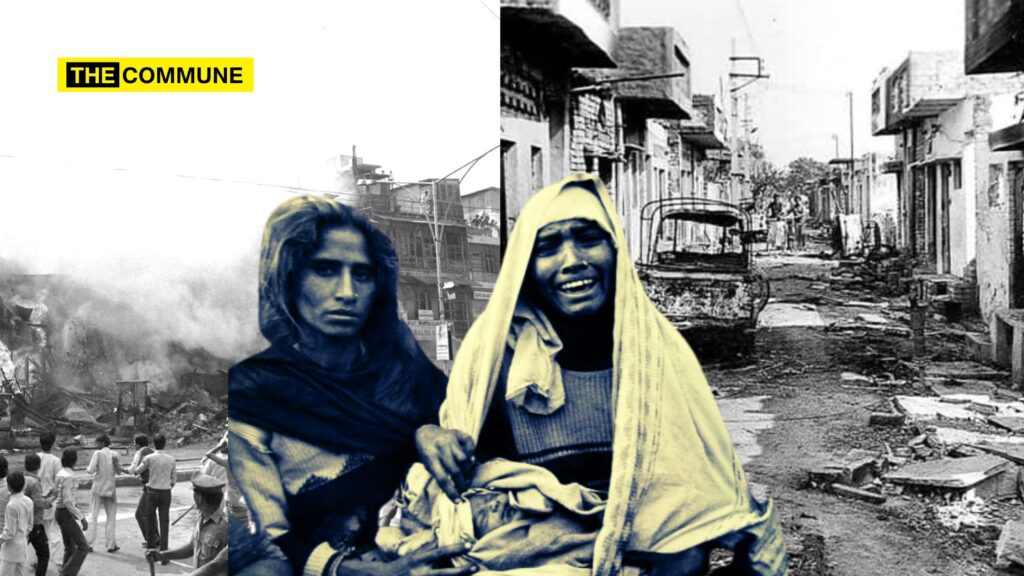This day is marked by the ghastly violence unleashed against the Sikh community in the capital metro city and many parts of our country. It left behind a deep, unhealed wound in the minds of the victims’ families. Yes, it was on 1 November 1984 witnessed widespread attacks on members of the Sikh community across the country. While official records of the casualties were never adequately maintained or disclosed, different sources estimate that the death count surpassed 10,000 people.
According to official records, 2,733 Sikhs were killed in cold blood in Delhi alone, though human rights organizations place the number nearer to 4,000. The numbers in the rest of Bharat continue to defy documentation. This apart, many Gurdwaras (Sikh Temples) were damaged; properties, shops, and other businesses run by the Sikhs were subjected to arson and plundering. Lumpen elements ‘showed off their bravery’ in molesting the women.
Why This Tragedy?
To know the reason, we must go back to 1977-80. That was when the Janata Party government headed by Morarji Desai was in power. In 1979, Jarnail Singh Bhindranwale started gaining control Khalistani Movement. His influence grew daily, and he occupied Har Mandir Saheb, known as the Golden Temple, the most sacred place of worship for the Sikh community.
In 1979, Morarji’s government fell, and Charan Singh led a caretaker government for six months. In 1980, Indira Gandhi returned to power. The years 1980-83 witnessed several tragic incidents of terrorist acts in Punjab and Delhi. Initially, the weak-kneed approach of the Punjab State and Central governments made Bhindranwale a law unto himself. Finally, the Central government courageously sent the Armed Forces to Har Mandir Sahib.
This Operation Blue Star, despite the utmost restraint by our Army, managed to finish Bhindranwale and his men once and for all. However, many parts of the Golden Temple suffered colossal damage. The Central Government assured us that the repair and refurbishment would be completed immediately. However, the Sikh community felt hurt and alienated.
A section of Khalistanis was still active, and they schemed to assassinate the Prime Minister and the Army Officials who carried out Operation Blue Star. They made several unsuccessful attempts on the life of the PM, and finally, on 31 October 1984, the then Prime Minister of India, Prime Minister Indira Gandhi, met a tragic end when her security personnel turned against her at her official residence in New Delhi. Two of her bodyguards, Satwant Singh and Beant Singh, both members of India’s Sikh community, carried out the assassination. The incident occurred as she walked through the garden of her home on Safdarjung Road.
Hell Broke Out
As said in the beginning, after the assassination, as the nation was struggling to come to terms with the unfortunate tragedy, a catastrophe of unimaginable proportions started building up.
The violence was carried out with shocking brutality, as attackers used crude weapons, including knives and clubs. Many victims faced horrific deaths through savage beatings, while others were set ablaze and burned to death. One particularly cruel method of torture involved using burning automobile tyres to inflict a slow and agonizing death on Sikh victims. This method became symbolic of the shocking inhumanity displayed during the violence.
The madness continued for several days as the law-enforcing machinery refused to intervene. Holding onto the voter list and ration card details, a group of men carried out attacks on the Sikh population, locality by locality, in a targeted manner.
Several neighbourhoods in Delhi bore the brunt of the violence, particularly the areas of Shahadara, Trilokpuri, Mongolpuri, Nand Nagri, Sultanpuri, and Geeta Colony. Reports indicate that approximately 20,000 people were forced to flee the capital city, while more than a thousand were left homeless. The violence spread beyond Delhi, with Sikh communities facing attacks across multiple northern states, including Himachal Pradesh, Haryana, Rajasthan, Madhya Pradesh, and Uttar Pradesh.
Was It Spontaneous?
There have been efforts to portray the violence as a spontaneous outburst by people grieving their prime minister’s death. However, closer examination reveals evidence of a carefully crafted and organized plan aimed at “teaching the Sikhs a lesson.”
Former union ministers Kamal Nath and HKL Bhagat, Congress leaders Jagdish Tytler, and Congress lawmakers Sajjan Kumar, Lalit Makan, and Dharam Das Shastri were some of the key accused in riot cases for instigating mobs. As reported by Sudip Mazumdar, a Journalist (eyewitness) who deposed in the Nanavathy Commission subsequently said that Jagdish Tytler was found dictating to the Delhi Police Commissioner. The same was the case with other Congress MPs and leaders of Delhi.
Epilogue
It is unfortunate that as a nation, we have failed to render justice to the affected families. To rub salt in the wounds, Prime Minister Rajiv Gandhi, on 19 November 1984, in his speech, said, “Some riots took place in the country following the murder of Indiraji. We know the people were outraged, and for a few days, it seemed India had been shaken. But when a mighty tree falls, it is only natural that the earth around it does shake a little.”
The riots and the orchestrated pogrom against the Sikh community left a deep divide between the Hindus and Sikhs. The riots were held up as excuses to revive, and the violence ruled Punjab for over two decades, though Bhindranwale was removed from the scene in mid-1984, the Khalistani movement was revived citing the Riots. Unfortunately, the justice has not been meted out to the Sikh Community.
Keeping politics away, Rashtriya Swayamsevak Sangh focuses on bringing both communities together in the nation’s interests.
Jambunaathan is a journalist and content writer who specializes in national and social development stories and, as part of a national magazine’s editorial team and mentors young writers.
Subscribe to our Telegram, WhatsApp, and Instagram channels and get the best stories of the day delivered to you personally.

